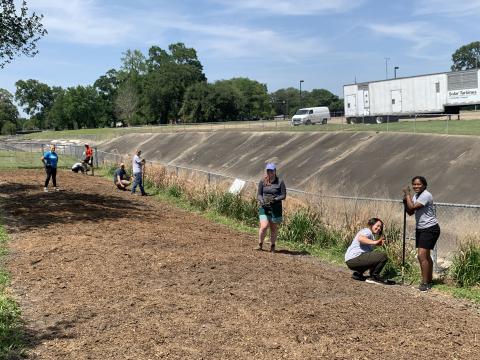Bourgeois Park Projects
Creating urban prairies and native plantings on campus is an initiative of the University's Sustainability Strategic Plan that aligns with the Office of Sustainability's storm water management master plan. There are two complete prairie projects:
- Bourgeois Park Urban Prairie Coulee Planting
- Bourgeois Park Coulee Vegetated Buffer Strips / Grassed Riparian Buffers
Bourgeois Park Urban Prairie Coulee Planting
The Ecology Center grew and planted around 800 native seedlings along the coulee edge. The planting team included the Office of Sustainability, The Ecology Center, and AmeriCorps to plant a variety of native plants, grasses, and flowers. Areas like the Bourgeois Park Native Coulee Planting reduce the need for mowing, provide habitat for bees, bird, butterflies and other pollinators, and help reduce storm water runoff.
Future phases of the project call for installation of hydrological sensors at the site, which will enable researchers to analyze soil over long periods for water quality, filtration capacity and carbon levels. Students from the College of Engineering and the Louisiana Watershed Flood Center will be able to study flood control, while students from the Ray P. Authement College of Sciences will be able to examine soil quality, botany and insect and bird populations.
No Mow No Spray, Pollinator Habitit Signs were installed at the Urban Prairie in 2024 as part of the Living Lab Signage Project.

Before - May 2022 After - Feburary 2023
Bourgeois Park Coulee Vegetated Buffer Strips / Grassed Riparian Buffers
The first phase of the Bourgeois Park Projects was lining four acres along the Coulee Mine that bisects University Common behind Blackham Coliseum with native plants, a campus urban prairie initiative supported by the CenterPoint Energy Foundation. Switchgrass and Louisiana bluestar were planted along the coulee in 2019. Something to note about the planting is that it also acts as a natural buffer that keeps litter out of the Coulee Mine.
The work will lay the foundation for the planned Cajun Prairie Habitat and Outdoor Classroom, a place where researchers, students and community officials can learn about, for starters, the ecological value of native flowers and grasses.
“That’s one of the most important components of the project, because native plants’ expansive, fibrous root systems hold soil, reducing erosion caused by storm water runoff. They slow water drainage, which reduces flooding, and also filter contaminants,” explained Gretchen LaCombe Vanicor, director of the University’s Office of Sustainability.
Freshly Planted- May 2020 Mature Plantings- Feburary 2023
